小升初英语总复习 代词课件(147张幻灯片)
文档属性
| 名称 | 小升初英语总复习 代词课件(147张幻灯片) |

|
|
| 格式 | pptx | ||
| 文件大小 | 3.5MB | ||
| 资源类型 | 教案 | ||
| 版本资源 | 人教版(PEP) | ||
| 科目 | 英语 | ||
| 更新时间 | 2021-04-13 00:00:00 | ||
图片预览

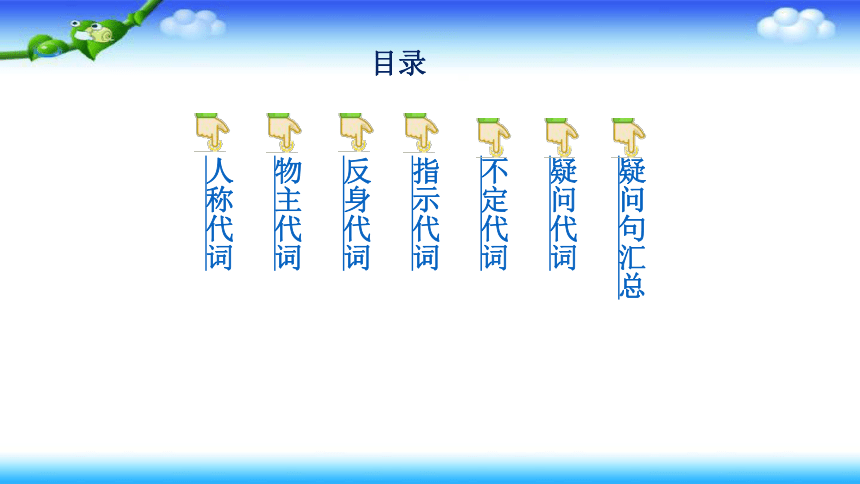
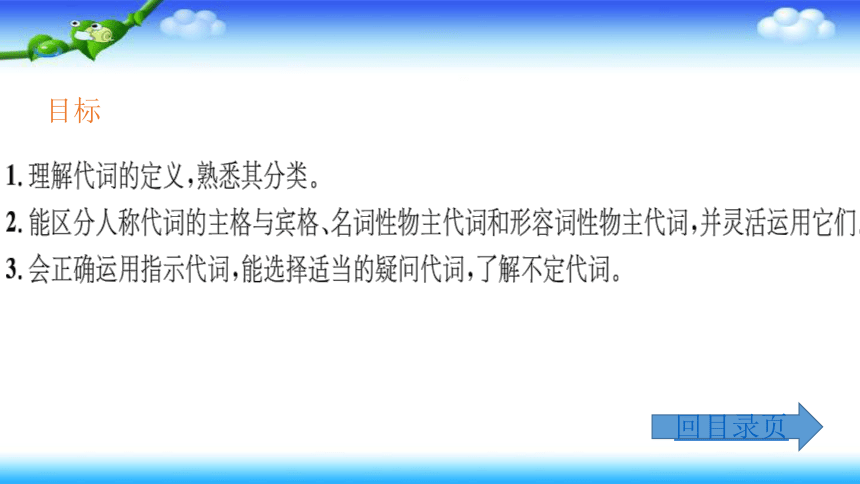
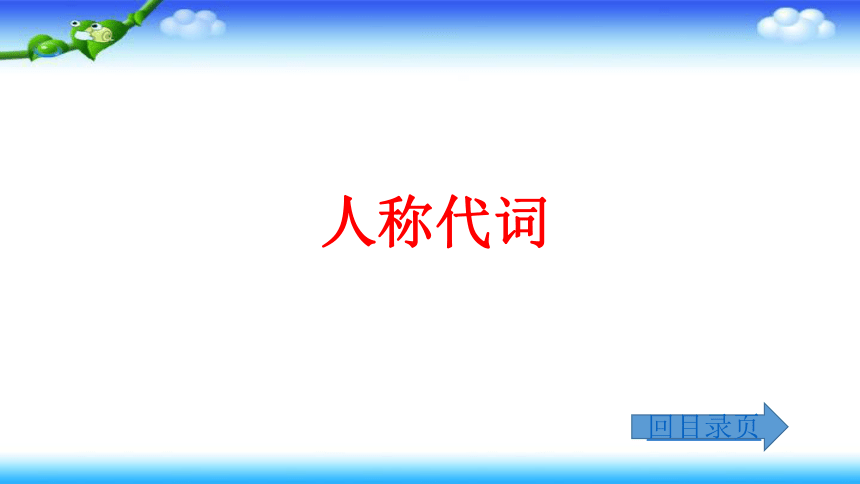
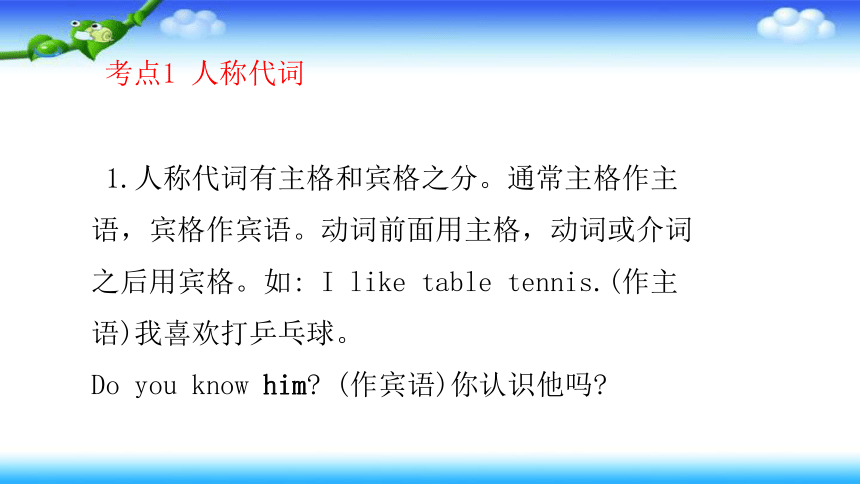
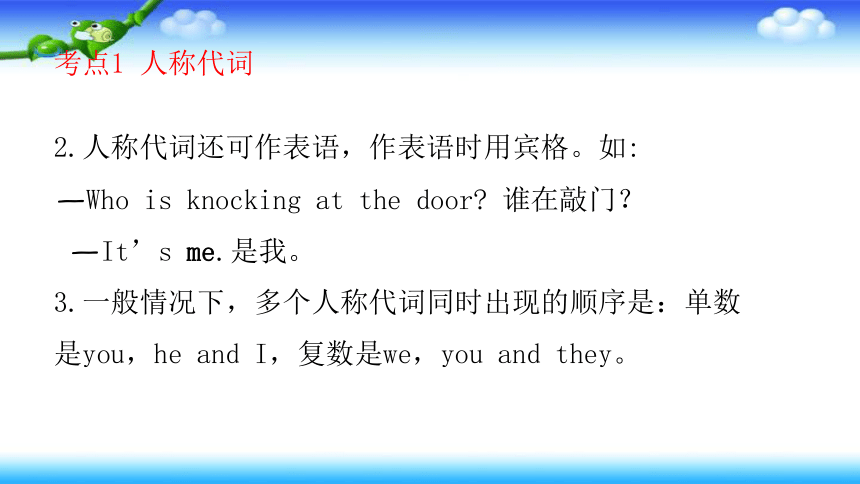
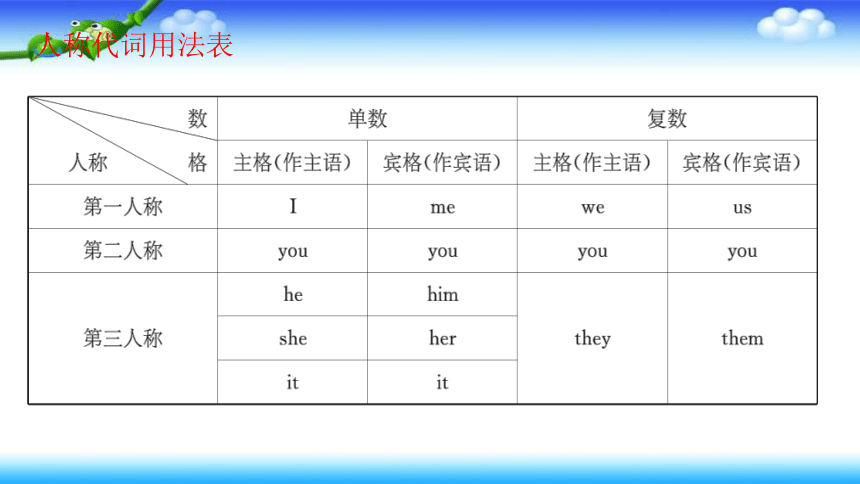
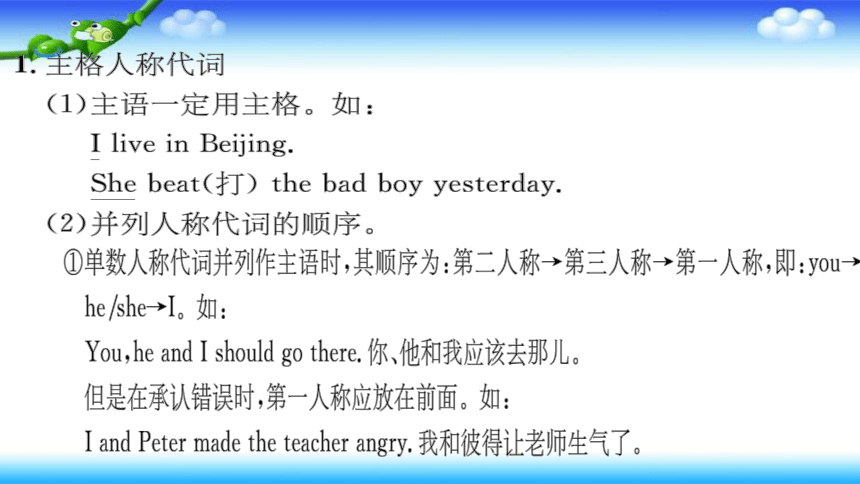
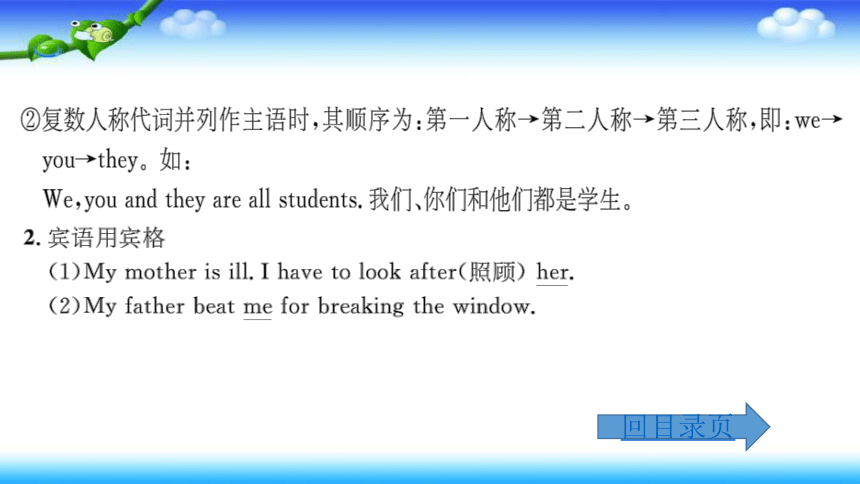
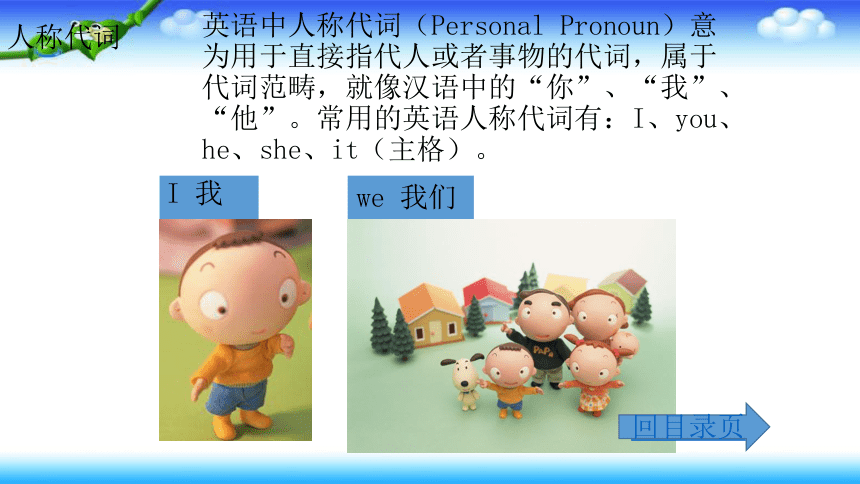
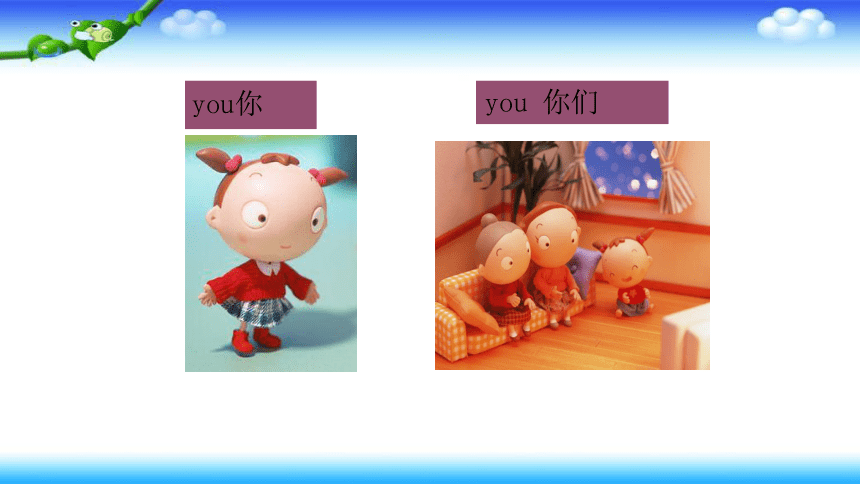
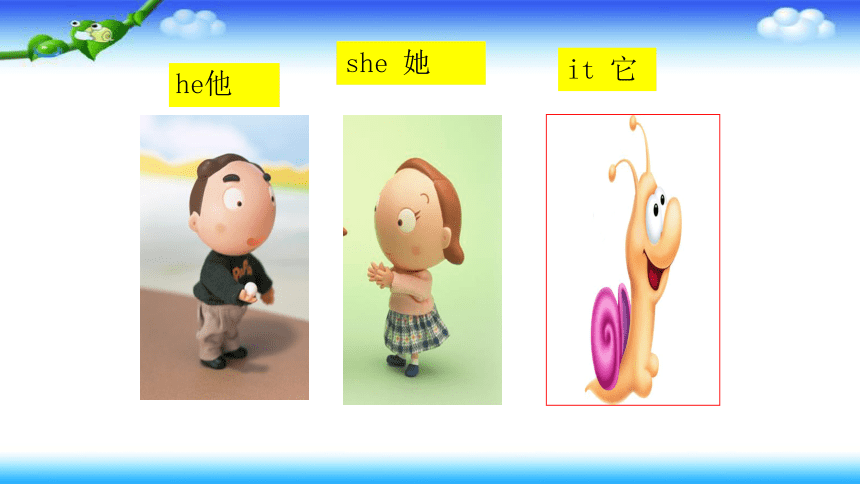
文档简介
代词
疑问句汇总
疑问代词
不定代词
指示代词
反身代词
物主代词
人称代词
目录
目标
回目录页
人称代词
回目录页
考点1 人称代词
1.人称代词有主格和宾格之分。通常主格作主语,宾格作宾语。动词前面用主格,动词或介词之后用宾格。如: I like table tennis.(作主语)我喜欢打乒乓球。
Do you know him? (作宾语)你认识他吗?
2.人称代词还可作表语,作表语时用宾格。如:
—Who is knocking at the door? 谁在敲门?
—It’s me.是我。
3.一般情况下,多个人称代词同时出现的顺序是:单数是you,he and I,复数是we,you and they。
考点1 人称代词
人称代词用法表
回目录页
人称代词
I 我
we 我们
英语中人称代词(Personal Pronoun)意为用于直接指代人或者事物的代词,属于代词范畴,就像汉语中的“你”、“我”、“他”。常用的英语人称代词有:I、you、he、she、it(主格)。
回目录页
you你
you 你们
he他
she 她
it 它
they 他们 她们它们
人称代词
I 我
we 我们
you你
you 你们
he他
she 她
it 它
they
他们 她们它们
单数 复数
人称代词充当名词作主语
第一人称
我
我们
第二人称
你
你们
第三人称
他/她/它
他们
第一人称
第三人称
第二人称
I
we
you
you
he/she/it
they
I am a sheep
It is a dog
They are boys and girls
He is a police
She is a teacher
人称代词充当宾语放在动词后)
第一人称
我
我们
第二人称
你
你们
第三人称
他/她/它
他们
第一人称
第三人称
第二人称
us
you
you
him/her/it
them
me
Thank you very much.
Give us some drinks.
Give me some bananas.
I take her to the garden
人称代词(充当形容词)
第一人称
我的
我们的
第二人称
你的
你们的
第三人称
他的/她的/它的
他们的
第一人称
第三人称
第二人称
my
our
your
your
his/her/its
their
Her father is a doctor.
This is his cartoon book.
They are their books.
This is my house.
This is your bag.
人称代词(充当名词)
第一人称
我的
我们的
第二人称
你的
你们的
第三人称
他的/她的/它的
他们的
第一人称
第三人称
第二人称
mine
ours
yours
yours
his/hers/its
theirs
This cartoon book is his
These books
This house is mine
This bag is yours
回目录页
人称
第一人称
第二人称
第三人称
代词及be动词
用法
单数
复数
单数
复数
单数
复数
主格
I
we
you
you
she/he/it
they
宾格
me
us
you
you
her/him/it
them
形容词性物
主代词
my
our
your
your
her/his/its
their
名词性物主代词
mine
ours
yours
yours
hers/his/
its
theirs
Be动词现在时
am
are
are
are
is
are
Be动词过去时
was
were
were
were
was
were
人称代词及be动词用法
I am 我是 We are我们是
You are你是 You are你们是
He is/She is /It is他/她/它是
They are 他们/她们/它们是
看看它们的缩写形式吧
I am=I’m we are =we’re
you are=you’re you are=you’re
they are=they’re he is =he’s
she is =she’s it is=it’s
is not=isn’t are not=aren’t
am not永远没有缩写形式。
人
称
分类
第一人称
第二人称
第三人称
单数
复数
单数
复数
单数
复数
主 格
宾 格
I
we
me
us
you
you
you
you
he
she
it
him
her
it
them
they
形容词性物主代词
my
our
your
your
his
her
its
their
人称代词表
主格:在句子中做主语,用在动词之前。be动词(am, is , are),have/has, like...
I have a bike.
We are a happy family.
She likes playing basketball.
宾格:在句子中做宾语,用在动词或介词之后。
Show me that jacket.
Let us chant.
The boy is me.
They love us.
The hat is for him.
形容词性物主代词具有形容词的特性,常放在名词前面作定语,表明该名词所表示的人或物是"谁的"。
1. 形容词性物主代词相当于形容词,在句中只能用作定语,后面必须跟名词。例如:
Is that your bike? 那是你的自行车吗?
2. 如果名词前用了形容词性物主代词,就不能再用冠词(a, an, the)、指示代词(this, that, these, those)等修饰词了。例如:
这是他的书桌。
误:This is his a desk.
正:This is his desk.
3. 与形容词一起修饰名词时,形容词性物主代词要放在形容词的前面。如:
his English books他的英语书
their Chinese friends他们的中国朋友
4. 汉语中经常会出现"我妈妈","你们老师"等这样的语言现象,
虽然代词用的是"我" "你们",但实际意义仍是"我的" "你们的",
所以在英译时,注意要用形容词性物主代词"my" "your"。例如:
你妈妈在家吗?
误:Is you mother at home?
正:Is your mother at home?
5. it's与its读音相同,he's与his读音相似,
但使用时需注意它们的区别(it's和he's分别是
it is和he is的缩略形式,
但its 和his 却是形容词性物主代词) 。
例如:
It's a bird. Its name is Polly.
它是一只鸟。它的名字叫波利。
He's a student. His mother is a teacher.
他是一名学生。他妈妈是一位教师。
回目录页
人称代词练习题
回目录页
人称代词练习题
一、用人称代词代替下列各词:
1. Mr Li
2. her uncle
3. Miss Liu
4. my family
5. my cousin and I
6. our pencils
he
she
they
it/they
he
we
7. its tail 8. his grandmother
9. your T-shirt 10.Bob
11.their pears 12.the park
13.Jenny 14.the animals
15.my mother and father
they
it
she
it
they
they
she
it
he
一、用人称代词代替下列各词:
演练场
( )1. —What’s ____ telephone number?
—It’s 83412.
A.you B. your C. I D. They
( )2. —Is he Li Ping? —Yes, ____.
A. I’m B. he’s C. he is D. They are
( )3. —What are these? —____ are desks.
A. This B. Those C. They D. It
( )4. —Who’s that, Kangkang? —____ Mary.
A.That’s B. She’s C. He’s D. They’re
二、单项选择
( )5. —Are those books? —Yes, ____.
A. they are B. they aren’t C. those are D. those aren’t
( )6. —Is that an orange? —____. It’s an apple.
A. Yes B. No C. It is D. It isn’t
( )7. —What’s ____ over there(在那边)?
—It’s a bus.
A. these B. those C. this D. that
1.This isn’t______knife.(she)
2.These are your books,Kate.
Put_______ in the desk,please.(they)
3.-Wei Fang,is that_______ ruler?
-Yes,it is.( you )
4.It's Lin Tao's bag. Give it to _________.( he )
5.Don't worry,Let_____( I )help_______.( you)
her
them
your
him
me
you
三、用所给词的适当形式填空,完成句子或对话。
6._____ is a boy, _____ name is Mike.
Mike’s friends like _____ very much.( he )
7.My sister is in _____ room.
_____ is a teacher.( she )
8.Jane is a little girl.
_____ mother is a nurse. ( she )
his
He
him
her
She
Her
9.My father and mother are teachers.
_____ are busy ( them)
They
This is(my / I)mother.
2. Nice to meet (your / you).
3. (He / His)name is Mark.
4. What’s(she / her)name?
5. Excuse(me / my / I).
6. Are(your / you)Miss Li?
7. (I / My)am Ben.
8. (She / Her)is my sister.
四、勾选出合适的单词,完成句子。
?
?
?
?
?
?
?
?
用所给代词的适当形式填空。
1. These are ______ ( he ) brothers.
2. That is _______( she ) sister.
3. Lily is _______ ( Lucy ) sister.
4. Tom, this is _____ ( me ) cousin, Mary.
5. Now _____________(her parents)? are in America.
6. Those __________ ( child ) are _____ ( I ) father’s students.
my
her
Lucy's
my
they
children
his
7. Do you know? ______ ( it ) name?
8. Mike and Tom __________ ( be ) friends.
9. Thanks for helping ________( I ).
10. ______(Ann安) mother is ______(we) teacher.
its
are
me
Ann’s
our
回目录页
物主代词
回目录页
物主代词
1.表示所有关系的代词叫物主代词。物主代词分形容词性物主代词和名词性物主代词。
数
人称
类别
单数
复数
第一人称
第二人称
第三
人称
第一
人称
第二
人称
第三
人称
形容词性物主代词
my
your
his
her
its
our
your
their
名词性物主代词
mine
yours
his
hers
its
ours
yours
theirs
中文意思
我的
你的
他的
她的
它的
我们的
你们的
他(她、它)们的
物主代词表
物主代词
2.形容词性物主代词的作用相当于形容词,可在句中作定语。一般情况下形容词性物主代词后面接名词。如:
Our teacher is coming to see us.我们的老师要来看我们了。
3.名词性物主代词的作用相当于名词,在句中可用作主语、宾语和表语。一般情况下名词性物主代词后面不可接名词。如:
Our school is here and theirs is there.
(作主语)我们的学校在这里,他们的在那里。
考点训练
( )1. (广东)—Oh! I came in a hurry and forgot to bring food.
—It doesn’t matter. You can have ______.
A.we B.us
C.our D.ours
( )2. Mary and Gina are my cousins. father works in Dongfeng Company.
A.Their B.They
C.Them D.Theirs
D
A
物主代词
( )3.(广东)—Is that_______ dog?
—No. ______ is white.
A.his;His B.her;His
C.he;His D.her;He
( )4.—Sam, who teaches_______ Chinese?
—Mrs.White.She has lived in China for years. Chinese is very good.
A.you; Her B.your; Hers
C.you; Him D.your; She
A
A
回目录页
反身代词
回目录页
英语中用来表示“我自己”,“你自己”,“他自己”, “我们自己”,“你们自己”,“他们自己”等意义的代词称为反身代词,也有人称之为自身代名词,其形式如下表所示:
反身代词
回目录页
反身代词
反身代词小学阶段只作拓展了解,不是主要考点
( )1.(广东)—Look at this model ship.I made it all by ______.
last week.
—Wow, you are so smart!
A.me B.my
C.mine D.myself
( )2.Don’t worry.We’re old enough to look after ______.
A.Myself
B.me
C.ourselves
D.us
D
C
回目录页
指示代词
回目录页
指示代词
1.指示代词包括:this,that,these,those
(1)this和these一般用来指在时间或空间上较近的事物或人,that和those则指时间或空间上较远的事物或人。如:
This is a pen and that is a pencil.这是一支钢笔,那是一支铅笔。
We are busy these days.这些天我们很忙。
(2)有时that和those指前面讲到过的事物,this和these则是指下面将要讲到的事物。如:
I had a cold. That’s why I didn’t come.
我感冒了,这就是我没有来的原因。
What I want to say is this: I really like learning English.
我想说的是:我真的喜欢学习英语。
(3)有时为了避免重复提到的名词,常可用that或those代替。如:
TV sets made in Beijing are just as good as those made in Shanghai.在北京生产的电视机和那些在上海生产的一样好。
指示代词
巧学妙记
this,these靠近我,that,those离我远。
this,that指单数, these,those不指单。
都可用the来代替,劝君务必莫忘记。
指示代词
(4)this在电话用语中代表自己,that则代表对方。如:
Hello! This is Mary. Is that Jack speaking?
你好!我是玛丽,你是杰克吗?
it,one,that作代词的区别
(1)it指上文提到过的事物。如:
The book is mine. It is very interesting.
这本书是我的。它非常有趣。
【拓展知识点】
(2)one泛指上下文提及的同类事物中的一个。如:
Your bike is very beautiful. I also want to buy one .你的自行车很漂亮。我也想买一辆。
【拓展知识点】
(3)that常用于比较结构中,代替前面提到的不可数名词或可数名词单数,指代可数名词复数时,要用those,为了避免重复。如:
The weather in Beijing is much colder than that in Zhanjiang.北京的天气比湛江冷多了。
The flowers on the left are more beautiful than those on the right.左边的花比右侧的更美丽。
【拓展知识点】
( )1.(广东)—I’m a little hungry, Daddy.
—See the cupcakes on the plate, but you can only take______.Dinner is ready soon.
A.it B.one
C.this D.that
( )2.I can’t find my ticket.I think I have lost ______.
A.it
B.one
C.at
D.on
B
A
指示代词
( )3.(广东)—Hello, Linda speaking. Who’s______?
—Hello, this is Martin.
A.he
B.one
C.that
D.this
( )4.The weather in summer in Beijing is cooler than ______ in Shanghai.
A.this
B. it
C.that
D.one
C
C
指示代词
回目录页
不定代词
回目录页
不定代词
不定代词
1.常见的不定代词有:some, any, one, each, every, no, none, all, both, either, neither, many, much,a few,a little,other, another, the other等。
2.形容词修饰something, anything, nothing, somebody, anybody,nobody, everything, everyone, everybody等不定代词时,形容词放在不定代词的后面。如:
something important 重要的东西
nothing interesting 没有有趣的东西
不定代词
3.易混不定代词辨析。
(1)some,any
some,any都意为“一些”,既可以修饰或代替可数名词复数,也可以修饰或代替不可数名词。some常用在肯定句中;any多用于否定句、疑问句及条件句中。
练习:①I have ______ tea here.
②I can’t see ______ tea.
some
any
不定代词
(2)many,much
many,much都表示“许多”的意思,主要用于否定句和疑问句中,在肯定句中多用a lot of,lots of等。many修饰或代替可数名词的复数,其反义词是few;而much修饰或代替不可数名词,其反义词是little。
练习:①I didn’t know ______ English people who could speak Chinese.
②Is there ______ water in the bottle?
many
much
不定代词
(3)few,a few,little,a little
few,a few用来修饰或代替复数可数名词;little,a little用来修饰或代替不可数名词;few,little表示否定,意为“很少、几乎没有”;a few,a little表示肯定,意为“一些、少许”。
不定代词
用few,a few,little,a little填空
练习:①He is now out of work and can earn ______ money.
②I’m from England,but I can speak ___ ______ French.
③_____ students in this school can speak Japanese.They speak South Korean.
④There are still ___ ______ students in the classroom.
little
a
little
Few
a few
不定代词
(4)another,other,others,the other和the others的区别
①another泛指三者或三者以上中的任何一个,表示“又一(个),又一些;另外的(人、物),别的(人、物)”,既可用作形容词又可用作代词。
不定代词
②other表示“另外的”,常与复数名词或不可数名词连用;前面有the,this,that,some,any,each,every,no,one,my,your,his等,则可与单数名词连用。
不定代词
③others泛指别的人或物,是other的复数形式,泛指别的人或物(但不是全部),不能作定语,some...others=(the other+复数名词)“一些……另一些……”。
不定代词
④the other表示“两者中的另一个”,one...the other...意为“(两者中的)一个……另一个……”。修饰单数名词意为“(两者中)另一个”,修饰复数名词意为“(两部分中)剩下的,其余的”。
⑤the others=the other+名词复数:指剩下的人(或物),其余的(或物)。练习:
①We need ______________ four people.
②__________ people may think like that.
③Some of the questions are hard;____________ are easy.
④He has two sons.One is thin and ____________ is fat.
⑤There are 50 students in my class.30 are boys,________________ are girls.
another
Other
Others
the other
the others
不定代词
(5)none,no one
none表示三者或三者以上全部否定,意为“全都不”。none既可指人又可指物,通常后接of短语。none用作主语时,谓语动词用单复数均可。none常用来回答how many/much的提问。
no one表示三者或三者以上全部否定,与nobody同义,只用来指人,其后一般不跟of短语。no one常用来回答who的提问。
不定代词
练习:
①______ of us want(s) to go,but we have to.
②Everyone is here;________ is away.
None
No one
不定代词
(6)all,both
all指三者以上,或不可数的东西。谓语动词既可以用单数,也可以用作复数。
both作代词。①与其他名词或代词并列出现,表示“两个都”。②与“of+代词(或名词)”连用,表示“两者都”。
练习:①______ of us like Mr.Pope.
②Lucy and Lily ______ agree with us.
All
both
不定代词
不定代词
(7)neither,either
neither表示“两者都不……”。作主语谓语动词用单数。
either表示“两个中的任何一个”,可修饰或代替单数可数名词。作主语谓语动词用单数。
练习:①_________of the knives is useful.
②__________of them was in good health, but both worked very hard.
Either
Neither
( )1.(广东)—Which basketball player do you like best, Kobe, James or Jordan?
—______ of them. Lin Shuhao is my favourite.
A.All B.None
C.Either D.Neither
( )2.—We have red and yellow T-shirts.Which color do you like?
—I’m afraid______.
I think blue will be OK.
A.both B.either C.neither D.none
B
C
不定代词
回目录页
疑问代词
回目录页
疑问代词是用来表达疑问或构成疑问句的代词。一般放句首
疑问代词
疑问代词有who,whom,whose,what和which等。疑问代词用于特殊疑问句中,一般都放在句首,并在句子中作为某一句子成分。如:
Who is going to come here tomorrow?(作主语)明天谁会来这里?
What is that? (作表语)那是什么?
常见疑问代词表
疑问代词
疑问代词
放飞气球
说出下列疑问代词的中文意思,气球便能飞上天,一个气球20points
who
whose
what
whom
which
疑问代词
意义
指代对象
What
Whose
Whom
Who
谁(主格) 人
谁(宾格) 人
谁的 人
什么 事物
Which
哪一个 人, 事物
Who
Who意为“谁”,只能对人进行提问通常做主语
Who is reading an English book?
谁在看英语书?
(1) who whom 的用法
who只能指人,常作主语和表语,只有名词性质。在非正式英语和口语中,who可以替代whom,但介词后面要用whom;whom也指人,常作宾语,也只有名词性质。
Who did this?
Who is it?
Who do you like best?(口语)
Whom do you like best?(较正式)
With whom did you go?
Whose
Whose意为“谁的”用于询问名词的所属关系,常在句子中做主语,宾语,定语和表语。
(2)Whose 的用法
Whose和物主代词一样,具有名词和形容词性质,可作主语、表语和定语。
Whose is better?/ Whose are better?
Whose shirt is this ?
Whose is this ?
Whose book is this?这是谁的书?
(作定语)
Whose is better,yours or hers?
谁的更好,你的还是她的?
(作主语)
Whose are you going to borrow? 你准备借谁的?
(作宾语)
Whose is this desk? 这个课桌是谁的?
(作表语)
What
What意为“什么”对人或事物提问,可单独使用,也可放在名词前。
在句中可做主语,宾语,表语和定语。
(3)What 的用法
What表示“什么(人或物)具有名词和形容词 性
质,作主语、宾语、表语、定语等。
What happened?(主语)
What are you doing?(宾语)
What is happiness?(表语)
What question do you want to ask?(定语)
What happened yesterday?
昨天发生了什么事?
(作主语)
What do you usually do on Sundays?
星期天你经常做什么?
(作宾语)
What’s your mother?
你妈妈是干什么的?
(作表语)
What colour is your coat? 你的外套是什么颜色?
(作定语)
Which
Which意为哪一个”,”哪一些”在一定范围内对人或事物提问,在句中作主语,宾语和定语
Which of them came late? (作主语) 他们谁迟到了?
(4)Which 的用法
Which表示“在一定范围内的哪一个(哪一些)人和物”,可用作单数和复数,具有名词和形容词的性质,用作主语、定语、宾语等。如:
Which are yours ?/ Which is yours?(主语)
Which do you perfer?(宾语) Which language is the most widely spoken in the world? (定语)
Which cities are you going to visit ? 你打算游览哪些城市?
(作定语)
Which do you like better,football or basketball?
你更喜欢哪一种,足球还是篮球?
(作宾语)
疑问代词的用法比较
(1)who与what的区别:who多用来问姓名、关系等,what多用来问职业、地位等。如:What is he ?---He is a director.
(2)which 和who,what的区别:who, what用来泛指,而 which是特指,表示“在一定范围内的哪个或哪些人,事物”。如:
Who is Tom?(泛指)
Which is Tom? (特指)
What sport do you like best?
Which sport do you like best,football or basketball?
We can see a pencil on the desk.
(就划线部分提问)
_____ can you see on the desk ?
What
_____ do you like best,
football, volleyball or baseball?
A.Who B.Which
C.What D.Why
B
Miss Smith is her favourite teacher.
(就划线部分提问)
____ ____ her favourite teacher?
Who is
- coat is more beautiful than yours?
-Lily’s.
Which B. Whose
C. Who D. What
Whose
- are you taking the book to? 你要把这书带给谁?
A.Which B. Whose
C.Who D. Whom
D
Whom作介词to的宾语
what 什么,问东西 which 哪一个
whose 谁的,问谁的东西
who 谁,问人 主格
whom 谁,问人,宾格
how many多少,问可数东西的数量
how much多少,问不可数东西的数量,或问价格
how old 几岁了,问年龄
when 什么时候,问年份,月份或日期
what time 什么时间,问几点
where 在哪里,问地点
why 为什么 how 怎么样
各疑问词引导的
问句汇总
1. what引导的各种特殊疑问句。
01). 问运算:What's one plus two?
02). 问事物:What can you see in the picture?
03). 问时间:What's the time? \ What time is it?
04). 问颜色:What color is the car?
05). 问年级:What grade are you in?
06). 问班级:What class are you in?
07). 问评价:What do you think of this book?
08). 问座次:What row are you in?
09). 问星期:What day is it today?
10). 问日期:what’s the date today?
11). 问号码:What’s your telephone number?
/What number is the bus?
12). 问地址:What’s your address?
13). 问职业:What is your father?
14). 问尺码:What size do you wear?
15). 问人口:What’s the population in your country?
16). 问年龄:What’s your age?
17). 问意见:What’s your opinion?
18). 问价格:What’s the price?
19). 问天气:What’s the weather like in Beijing?
2. Which引导的特殊疑问
3.Whose 和Who
4. how引导的特殊疑问句
01). 问健康:How are you?
02). 问年龄:How old are you?
03). 问拼写:How do you spell it?
04). 问喜好:How do you like the film?
05). 问感受:How was your weekend?
06). 问天气:How is the weather?
07). 问方式:How does your sister go to school?
08). 问频率:How often does your father go to the
cinema?
09). 问多久:How soon will you finish your homework?
10). 问价格:How much is this computer?
11). 问多少:How many birds can you see in the
picture?(询问对象为可数名词)
12). 问多少:How much water is there in the bottle?
13). 问深度、高度:How deep is the lake? / How tall is
your son?
14). 问路程:How far is it from your home to your
school?
15). 问长短:How long have you lived in Beijing?
5. where引导的特殊疑问句
只要是问“地点、位置、方向”的,用 “where”来提问,还要记住on, in, under, next to, behind, in front of, beside等方位词
-Where did you live ?
-I lived in Ottawa.
-Where is Harbin?
-It is in the north of China.
-Where are your books?
-They are in my bag.
-Where are you going?
-I am going to Japan.
-Where is my computer?
-It's behind the door.
-Where's Jim?
-He's at home.
-Where're Lucy's books?
-They are in her bag.
-Where’s the mobile phone?
-It’s on the desk.
-Where’re the shoes?
-They’re under the bed.
6. when引导的特殊疑问句
7.why引导的疑问句
why引导的疑问句:询问原因
它的回答只能用because引导的原因状语从句。
-Why are you late?
-Because I met the accident.
-Why didn't you see the movie?
-Because I had seen it before.
( )1.—______ is Jeremy Lin?
—He is a famous NBA basketball player.
A.Where B.What C.Why D.How old
( )2.—______ is your father?
—A bank clerk.He works in a bank near my home.
A.Where B.How
C.What D.Which
B
C
疑问代词题型展示
训练
( )1.—Do you like watching ping-pong matches?
—Yes, and ______ favorite ping-pong player is Ma Long.
A.we B.us C.our D.ours
( )2. The girl can't find ______ pen. Will you lend her ______?
A.his; your B.her; yours
C.she; yours D.her; your
C
B
( )3.—Hi, Sara.Is this ______ English book?
—No.______ is on the desk.
A.your; Mine B.your; My
C.yours; Mine D.your; My
A
( )4.Be careful with the knife.You may hurt______.
A.himself B.ourselves
C.myself D.yourself
D
( )5.Uncle Tom will come to visit ______ next Saturday.
A.we B.us C.our D.ours
B
( )6.My mother used to make breakfast for ______ every morning, but now I do it myself.
A.mine B.my C.I D.me
D
( )7.—Where did you go for your winter
vacation?
—My family went to Paris.______had a
great time.
A.He B.She C.We D.They
( )8.Tom and Mike are good friends.______often
help each other.
A.They B.Them C.Their D.Theirs
C
A
( )9.The man over there is ______ old friend. He is a policeman.
A.I B.me C.my D.mine
( )10.My brother likes painting. It’s one of ______ hobbies.
A.my B.her C.his D.your
C
C
( )11.We must protect plants.They are friends of ______.
A.we B.us C.our D.ours
( )12.—Excuse me, may I use your bicycle? ______ is broken.
—Certainly.But remember to return it before lunch.
A.I B.Me C.Myself D.Mine
D
D
( )13.I bought a smartphone(智能手机) yesterday, and it works well, would you like to buy ______ like this?
A.it B.this C.one D.that
( )14.—This book on idioms is interesting.I’d like ______, where did you buy it, Simon?
—In the Amazon Bookstore.
A.it B.this C.that D.one
C
D
( )15.Hurry up, kids! The school bus is coming. We have ______ time left.
A.few B.a few C.little D.a little
C
( )16.—Mom, what would you like, coffee or tea?
—______. Just water, please.
A.Either B.Both C.Neither D.None
C
( )17.At present, children mean ______
to most parents in China.
A.everything B.nothing
C.anything D.something
( )18.—Tom,supper is ready.
—I don’t want to eat ______,Mum.I’m
not feeling well.
A.everything B.nothing C.something
D.anything
A
D
( )19. —Do you know ______ Dengchao is?
—He is an actor. He is the team leader in the popular reality TV show Running Man now.
A.which B.when
C.what D.how
C
疑问句汇总
疑问代词
不定代词
指示代词
反身代词
物主代词
人称代词
目录
目标
回目录页
人称代词
回目录页
考点1 人称代词
1.人称代词有主格和宾格之分。通常主格作主语,宾格作宾语。动词前面用主格,动词或介词之后用宾格。如: I like table tennis.(作主语)我喜欢打乒乓球。
Do you know him? (作宾语)你认识他吗?
2.人称代词还可作表语,作表语时用宾格。如:
—Who is knocking at the door? 谁在敲门?
—It’s me.是我。
3.一般情况下,多个人称代词同时出现的顺序是:单数是you,he and I,复数是we,you and they。
考点1 人称代词
人称代词用法表
回目录页
人称代词
I 我
we 我们
英语中人称代词(Personal Pronoun)意为用于直接指代人或者事物的代词,属于代词范畴,就像汉语中的“你”、“我”、“他”。常用的英语人称代词有:I、you、he、she、it(主格)。
回目录页
you你
you 你们
he他
she 她
it 它
they 他们 她们它们
人称代词
I 我
we 我们
you你
you 你们
he他
she 她
it 它
they
他们 她们它们
单数 复数
人称代词充当名词作主语
第一人称
我
我们
第二人称
你
你们
第三人称
他/她/它
他们
第一人称
第三人称
第二人称
I
we
you
you
he/she/it
they
I am a sheep
It is a dog
They are boys and girls
He is a police
She is a teacher
人称代词充当宾语放在动词后)
第一人称
我
我们
第二人称
你
你们
第三人称
他/她/它
他们
第一人称
第三人称
第二人称
us
you
you
him/her/it
them
me
Thank you very much.
Give us some drinks.
Give me some bananas.
I take her to the garden
人称代词(充当形容词)
第一人称
我的
我们的
第二人称
你的
你们的
第三人称
他的/她的/它的
他们的
第一人称
第三人称
第二人称
my
our
your
your
his/her/its
their
Her father is a doctor.
This is his cartoon book.
They are their books.
This is my house.
This is your bag.
人称代词(充当名词)
第一人称
我的
我们的
第二人称
你的
你们的
第三人称
他的/她的/它的
他们的
第一人称
第三人称
第二人称
mine
ours
yours
yours
his/hers/its
theirs
This cartoon book is his
These books
This house is mine
This bag is yours
回目录页
人称
第一人称
第二人称
第三人称
代词及be动词
用法
单数
复数
单数
复数
单数
复数
主格
I
we
you
you
she/he/it
they
宾格
me
us
you
you
her/him/it
them
形容词性物
主代词
my
our
your
your
her/his/its
their
名词性物主代词
mine
ours
yours
yours
hers/his/
its
theirs
Be动词现在时
am
are
are
are
is
are
Be动词过去时
was
were
were
were
was
were
人称代词及be动词用法
I am 我是 We are我们是
You are你是 You are你们是
He is/She is /It is他/她/它是
They are 他们/她们/它们是
看看它们的缩写形式吧
I am=I’m we are =we’re
you are=you’re you are=you’re
they are=they’re he is =he’s
she is =she’s it is=it’s
is not=isn’t are not=aren’t
am not永远没有缩写形式。
人
称
分类
第一人称
第二人称
第三人称
单数
复数
单数
复数
单数
复数
主 格
宾 格
I
we
me
us
you
you
you
you
he
she
it
him
her
it
them
they
形容词性物主代词
my
our
your
your
his
her
its
their
人称代词表
主格:在句子中做主语,用在动词之前。be动词(am, is , are),have/has, like...
I have a bike.
We are a happy family.
She likes playing basketball.
宾格:在句子中做宾语,用在动词或介词之后。
Show me that jacket.
Let us chant.
The boy is me.
They love us.
The hat is for him.
形容词性物主代词具有形容词的特性,常放在名词前面作定语,表明该名词所表示的人或物是"谁的"。
1. 形容词性物主代词相当于形容词,在句中只能用作定语,后面必须跟名词。例如:
Is that your bike? 那是你的自行车吗?
2. 如果名词前用了形容词性物主代词,就不能再用冠词(a, an, the)、指示代词(this, that, these, those)等修饰词了。例如:
这是他的书桌。
误:This is his a desk.
正:This is his desk.
3. 与形容词一起修饰名词时,形容词性物主代词要放在形容词的前面。如:
his English books他的英语书
their Chinese friends他们的中国朋友
4. 汉语中经常会出现"我妈妈","你们老师"等这样的语言现象,
虽然代词用的是"我" "你们",但实际意义仍是"我的" "你们的",
所以在英译时,注意要用形容词性物主代词"my" "your"。例如:
你妈妈在家吗?
误:Is you mother at home?
正:Is your mother at home?
5. it's与its读音相同,he's与his读音相似,
但使用时需注意它们的区别(it's和he's分别是
it is和he is的缩略形式,
但its 和his 却是形容词性物主代词) 。
例如:
It's a bird. Its name is Polly.
它是一只鸟。它的名字叫波利。
He's a student. His mother is a teacher.
他是一名学生。他妈妈是一位教师。
回目录页
人称代词练习题
回目录页
人称代词练习题
一、用人称代词代替下列各词:
1. Mr Li
2. her uncle
3. Miss Liu
4. my family
5. my cousin and I
6. our pencils
he
she
they
it/they
he
we
7. its tail 8. his grandmother
9. your T-shirt 10.Bob
11.their pears 12.the park
13.Jenny 14.the animals
15.my mother and father
they
it
she
it
they
they
she
it
he
一、用人称代词代替下列各词:
演练场
( )1. —What’s ____ telephone number?
—It’s 83412.
A.you B. your C. I D. They
( )2. —Is he Li Ping? —Yes, ____.
A. I’m B. he’s C. he is D. They are
( )3. —What are these? —____ are desks.
A. This B. Those C. They D. It
( )4. —Who’s that, Kangkang? —____ Mary.
A.That’s B. She’s C. He’s D. They’re
二、单项选择
( )5. —Are those books? —Yes, ____.
A. they are B. they aren’t C. those are D. those aren’t
( )6. —Is that an orange? —____. It’s an apple.
A. Yes B. No C. It is D. It isn’t
( )7. —What’s ____ over there(在那边)?
—It’s a bus.
A. these B. those C. this D. that
1.This isn’t______knife.(she)
2.These are your books,Kate.
Put_______ in the desk,please.(they)
3.-Wei Fang,is that_______ ruler?
-Yes,it is.( you )
4.It's Lin Tao's bag. Give it to _________.( he )
5.Don't worry,Let_____( I )help_______.( you)
her
them
your
him
me
you
三、用所给词的适当形式填空,完成句子或对话。
6._____ is a boy, _____ name is Mike.
Mike’s friends like _____ very much.( he )
7.My sister is in _____ room.
_____ is a teacher.( she )
8.Jane is a little girl.
_____ mother is a nurse. ( she )
his
He
him
her
She
Her
9.My father and mother are teachers.
_____ are busy ( them)
They
This is(my / I)mother.
2. Nice to meet (your / you).
3. (He / His)name is Mark.
4. What’s(she / her)name?
5. Excuse(me / my / I).
6. Are(your / you)Miss Li?
7. (I / My)am Ben.
8. (She / Her)is my sister.
四、勾选出合适的单词,完成句子。
?
?
?
?
?
?
?
?
用所给代词的适当形式填空。
1. These are ______ ( he ) brothers.
2. That is _______( she ) sister.
3. Lily is _______ ( Lucy ) sister.
4. Tom, this is _____ ( me ) cousin, Mary.
5. Now _____________(her parents)? are in America.
6. Those __________ ( child ) are _____ ( I ) father’s students.
my
her
Lucy's
my
they
children
his
7. Do you know? ______ ( it ) name?
8. Mike and Tom __________ ( be ) friends.
9. Thanks for helping ________( I ).
10. ______(Ann安) mother is ______(we) teacher.
its
are
me
Ann’s
our
回目录页
物主代词
回目录页
物主代词
1.表示所有关系的代词叫物主代词。物主代词分形容词性物主代词和名词性物主代词。
数
人称
类别
单数
复数
第一人称
第二人称
第三
人称
第一
人称
第二
人称
第三
人称
形容词性物主代词
my
your
his
her
its
our
your
their
名词性物主代词
mine
yours
his
hers
its
ours
yours
theirs
中文意思
我的
你的
他的
她的
它的
我们的
你们的
他(她、它)们的
物主代词表
物主代词
2.形容词性物主代词的作用相当于形容词,可在句中作定语。一般情况下形容词性物主代词后面接名词。如:
Our teacher is coming to see us.我们的老师要来看我们了。
3.名词性物主代词的作用相当于名词,在句中可用作主语、宾语和表语。一般情况下名词性物主代词后面不可接名词。如:
Our school is here and theirs is there.
(作主语)我们的学校在这里,他们的在那里。
考点训练
( )1. (广东)—Oh! I came in a hurry and forgot to bring food.
—It doesn’t matter. You can have ______.
A.we B.us
C.our D.ours
( )2. Mary and Gina are my cousins. father works in Dongfeng Company.
A.Their B.They
C.Them D.Theirs
D
A
物主代词
( )3.(广东)—Is that_______ dog?
—No. ______ is white.
A.his;His B.her;His
C.he;His D.her;He
( )4.—Sam, who teaches_______ Chinese?
—Mrs.White.She has lived in China for years. Chinese is very good.
A.you; Her B.your; Hers
C.you; Him D.your; She
A
A
回目录页
反身代词
回目录页
英语中用来表示“我自己”,“你自己”,“他自己”, “我们自己”,“你们自己”,“他们自己”等意义的代词称为反身代词,也有人称之为自身代名词,其形式如下表所示:
反身代词
回目录页
反身代词
反身代词小学阶段只作拓展了解,不是主要考点
( )1.(广东)—Look at this model ship.I made it all by ______.
last week.
—Wow, you are so smart!
A.me B.my
C.mine D.myself
( )2.Don’t worry.We’re old enough to look after ______.
A.Myself
B.me
C.ourselves
D.us
D
C
回目录页
指示代词
回目录页
指示代词
1.指示代词包括:this,that,these,those
(1)this和these一般用来指在时间或空间上较近的事物或人,that和those则指时间或空间上较远的事物或人。如:
This is a pen and that is a pencil.这是一支钢笔,那是一支铅笔。
We are busy these days.这些天我们很忙。
(2)有时that和those指前面讲到过的事物,this和these则是指下面将要讲到的事物。如:
I had a cold. That’s why I didn’t come.
我感冒了,这就是我没有来的原因。
What I want to say is this: I really like learning English.
我想说的是:我真的喜欢学习英语。
(3)有时为了避免重复提到的名词,常可用that或those代替。如:
TV sets made in Beijing are just as good as those made in Shanghai.在北京生产的电视机和那些在上海生产的一样好。
指示代词
巧学妙记
this,these靠近我,that,those离我远。
this,that指单数, these,those不指单。
都可用the来代替,劝君务必莫忘记。
指示代词
(4)this在电话用语中代表自己,that则代表对方。如:
Hello! This is Mary. Is that Jack speaking?
你好!我是玛丽,你是杰克吗?
it,one,that作代词的区别
(1)it指上文提到过的事物。如:
The book is mine. It is very interesting.
这本书是我的。它非常有趣。
【拓展知识点】
(2)one泛指上下文提及的同类事物中的一个。如:
Your bike is very beautiful. I also want to buy one .你的自行车很漂亮。我也想买一辆。
【拓展知识点】
(3)that常用于比较结构中,代替前面提到的不可数名词或可数名词单数,指代可数名词复数时,要用those,为了避免重复。如:
The weather in Beijing is much colder than that in Zhanjiang.北京的天气比湛江冷多了。
The flowers on the left are more beautiful than those on the right.左边的花比右侧的更美丽。
【拓展知识点】
( )1.(广东)—I’m a little hungry, Daddy.
—See the cupcakes on the plate, but you can only take______.Dinner is ready soon.
A.it B.one
C.this D.that
( )2.I can’t find my ticket.I think I have lost ______.
A.it
B.one
C.at
D.on
B
A
指示代词
( )3.(广东)—Hello, Linda speaking. Who’s______?
—Hello, this is Martin.
A.he
B.one
C.that
D.this
( )4.The weather in summer in Beijing is cooler than ______ in Shanghai.
A.this
B. it
C.that
D.one
C
C
指示代词
回目录页
不定代词
回目录页
不定代词
不定代词
1.常见的不定代词有:some, any, one, each, every, no, none, all, both, either, neither, many, much,a few,a little,other, another, the other等。
2.形容词修饰something, anything, nothing, somebody, anybody,nobody, everything, everyone, everybody等不定代词时,形容词放在不定代词的后面。如:
something important 重要的东西
nothing interesting 没有有趣的东西
不定代词
3.易混不定代词辨析。
(1)some,any
some,any都意为“一些”,既可以修饰或代替可数名词复数,也可以修饰或代替不可数名词。some常用在肯定句中;any多用于否定句、疑问句及条件句中。
练习:①I have ______ tea here.
②I can’t see ______ tea.
some
any
不定代词
(2)many,much
many,much都表示“许多”的意思,主要用于否定句和疑问句中,在肯定句中多用a lot of,lots of等。many修饰或代替可数名词的复数,其反义词是few;而much修饰或代替不可数名词,其反义词是little。
练习:①I didn’t know ______ English people who could speak Chinese.
②Is there ______ water in the bottle?
many
much
不定代词
(3)few,a few,little,a little
few,a few用来修饰或代替复数可数名词;little,a little用来修饰或代替不可数名词;few,little表示否定,意为“很少、几乎没有”;a few,a little表示肯定,意为“一些、少许”。
不定代词
用few,a few,little,a little填空
练习:①He is now out of work and can earn ______ money.
②I’m from England,but I can speak ___ ______ French.
③_____ students in this school can speak Japanese.They speak South Korean.
④There are still ___ ______ students in the classroom.
little
a
little
Few
a few
不定代词
(4)another,other,others,the other和the others的区别
①another泛指三者或三者以上中的任何一个,表示“又一(个),又一些;另外的(人、物),别的(人、物)”,既可用作形容词又可用作代词。
不定代词
②other表示“另外的”,常与复数名词或不可数名词连用;前面有the,this,that,some,any,each,every,no,one,my,your,his等,则可与单数名词连用。
不定代词
③others泛指别的人或物,是other的复数形式,泛指别的人或物(但不是全部),不能作定语,some...others=(the other+复数名词)“一些……另一些……”。
不定代词
④the other表示“两者中的另一个”,one...the other...意为“(两者中的)一个……另一个……”。修饰单数名词意为“(两者中)另一个”,修饰复数名词意为“(两部分中)剩下的,其余的”。
⑤the others=the other+名词复数:指剩下的人(或物),其余的(或物)。练习:
①We need ______________ four people.
②__________ people may think like that.
③Some of the questions are hard;____________ are easy.
④He has two sons.One is thin and ____________ is fat.
⑤There are 50 students in my class.30 are boys,________________ are girls.
another
Other
Others
the other
the others
不定代词
(5)none,no one
none表示三者或三者以上全部否定,意为“全都不”。none既可指人又可指物,通常后接of短语。none用作主语时,谓语动词用单复数均可。none常用来回答how many/much的提问。
no one表示三者或三者以上全部否定,与nobody同义,只用来指人,其后一般不跟of短语。no one常用来回答who的提问。
不定代词
练习:
①______ of us want(s) to go,but we have to.
②Everyone is here;________ is away.
None
No one
不定代词
(6)all,both
all指三者以上,或不可数的东西。谓语动词既可以用单数,也可以用作复数。
both作代词。①与其他名词或代词并列出现,表示“两个都”。②与“of+代词(或名词)”连用,表示“两者都”。
练习:①______ of us like Mr.Pope.
②Lucy and Lily ______ agree with us.
All
both
不定代词
不定代词
(7)neither,either
neither表示“两者都不……”。作主语谓语动词用单数。
either表示“两个中的任何一个”,可修饰或代替单数可数名词。作主语谓语动词用单数。
练习:①_________of the knives is useful.
②__________of them was in good health, but both worked very hard.
Either
Neither
( )1.(广东)—Which basketball player do you like best, Kobe, James or Jordan?
—______ of them. Lin Shuhao is my favourite.
A.All B.None
C.Either D.Neither
( )2.—We have red and yellow T-shirts.Which color do you like?
—I’m afraid______.
I think blue will be OK.
A.both B.either C.neither D.none
B
C
不定代词
回目录页
疑问代词
回目录页
疑问代词是用来表达疑问或构成疑问句的代词。一般放句首
疑问代词
疑问代词有who,whom,whose,what和which等。疑问代词用于特殊疑问句中,一般都放在句首,并在句子中作为某一句子成分。如:
Who is going to come here tomorrow?(作主语)明天谁会来这里?
What is that? (作表语)那是什么?
常见疑问代词表
疑问代词
疑问代词
放飞气球
说出下列疑问代词的中文意思,气球便能飞上天,一个气球20points
who
whose
what
whom
which
疑问代词
意义
指代对象
What
Whose
Whom
Who
谁(主格) 人
谁(宾格) 人
谁的 人
什么 事物
Which
哪一个 人, 事物
Who
Who意为“谁”,只能对人进行提问通常做主语
Who is reading an English book?
谁在看英语书?
(1) who whom 的用法
who只能指人,常作主语和表语,只有名词性质。在非正式英语和口语中,who可以替代whom,但介词后面要用whom;whom也指人,常作宾语,也只有名词性质。
Who did this?
Who is it?
Who do you like best?(口语)
Whom do you like best?(较正式)
With whom did you go?
Whose
Whose意为“谁的”用于询问名词的所属关系,常在句子中做主语,宾语,定语和表语。
(2)Whose 的用法
Whose和物主代词一样,具有名词和形容词性质,可作主语、表语和定语。
Whose is better?/ Whose are better?
Whose shirt is this ?
Whose is this ?
Whose book is this?这是谁的书?
(作定语)
Whose is better,yours or hers?
谁的更好,你的还是她的?
(作主语)
Whose are you going to borrow? 你准备借谁的?
(作宾语)
Whose is this desk? 这个课桌是谁的?
(作表语)
What
What意为“什么”对人或事物提问,可单独使用,也可放在名词前。
在句中可做主语,宾语,表语和定语。
(3)What 的用法
What表示“什么(人或物)具有名词和形容词 性
质,作主语、宾语、表语、定语等。
What happened?(主语)
What are you doing?(宾语)
What is happiness?(表语)
What question do you want to ask?(定语)
What happened yesterday?
昨天发生了什么事?
(作主语)
What do you usually do on Sundays?
星期天你经常做什么?
(作宾语)
What’s your mother?
你妈妈是干什么的?
(作表语)
What colour is your coat? 你的外套是什么颜色?
(作定语)
Which
Which意为哪一个”,”哪一些”在一定范围内对人或事物提问,在句中作主语,宾语和定语
Which of them came late? (作主语) 他们谁迟到了?
(4)Which 的用法
Which表示“在一定范围内的哪一个(哪一些)人和物”,可用作单数和复数,具有名词和形容词的性质,用作主语、定语、宾语等。如:
Which are yours ?/ Which is yours?(主语)
Which do you perfer?(宾语) Which language is the most widely spoken in the world? (定语)
Which cities are you going to visit ? 你打算游览哪些城市?
(作定语)
Which do you like better,football or basketball?
你更喜欢哪一种,足球还是篮球?
(作宾语)
疑问代词的用法比较
(1)who与what的区别:who多用来问姓名、关系等,what多用来问职业、地位等。如:What is he ?---He is a director.
(2)which 和who,what的区别:who, what用来泛指,而 which是特指,表示“在一定范围内的哪个或哪些人,事物”。如:
Who is Tom?(泛指)
Which is Tom? (特指)
What sport do you like best?
Which sport do you like best,football or basketball?
We can see a pencil on the desk.
(就划线部分提问)
_____ can you see on the desk ?
What
_____ do you like best,
football, volleyball or baseball?
A.Who B.Which
C.What D.Why
B
Miss Smith is her favourite teacher.
(就划线部分提问)
____ ____ her favourite teacher?
Who is
- coat is more beautiful than yours?
-Lily’s.
Which B. Whose
C. Who D. What
Whose
- are you taking the book to? 你要把这书带给谁?
A.Which B. Whose
C.Who D. Whom
D
Whom作介词to的宾语
what 什么,问东西 which 哪一个
whose 谁的,问谁的东西
who 谁,问人 主格
whom 谁,问人,宾格
how many多少,问可数东西的数量
how much多少,问不可数东西的数量,或问价格
how old 几岁了,问年龄
when 什么时候,问年份,月份或日期
what time 什么时间,问几点
where 在哪里,问地点
why 为什么 how 怎么样
各疑问词引导的
问句汇总
1. what引导的各种特殊疑问句。
01). 问运算:What's one plus two?
02). 问事物:What can you see in the picture?
03). 问时间:What's the time? \ What time is it?
04). 问颜色:What color is the car?
05). 问年级:What grade are you in?
06). 问班级:What class are you in?
07). 问评价:What do you think of this book?
08). 问座次:What row are you in?
09). 问星期:What day is it today?
10). 问日期:what’s the date today?
11). 问号码:What’s your telephone number?
/What number is the bus?
12). 问地址:What’s your address?
13). 问职业:What is your father?
14). 问尺码:What size do you wear?
15). 问人口:What’s the population in your country?
16). 问年龄:What’s your age?
17). 问意见:What’s your opinion?
18). 问价格:What’s the price?
19). 问天气:What’s the weather like in Beijing?
2. Which引导的特殊疑问
3.Whose 和Who
4. how引导的特殊疑问句
01). 问健康:How are you?
02). 问年龄:How old are you?
03). 问拼写:How do you spell it?
04). 问喜好:How do you like the film?
05). 问感受:How was your weekend?
06). 问天气:How is the weather?
07). 问方式:How does your sister go to school?
08). 问频率:How often does your father go to the
cinema?
09). 问多久:How soon will you finish your homework?
10). 问价格:How much is this computer?
11). 问多少:How many birds can you see in the
picture?(询问对象为可数名词)
12). 问多少:How much water is there in the bottle?
13). 问深度、高度:How deep is the lake? / How tall is
your son?
14). 问路程:How far is it from your home to your
school?
15). 问长短:How long have you lived in Beijing?
5. where引导的特殊疑问句
只要是问“地点、位置、方向”的,用 “where”来提问,还要记住on, in, under, next to, behind, in front of, beside等方位词
-Where did you live ?
-I lived in Ottawa.
-Where is Harbin?
-It is in the north of China.
-Where are your books?
-They are in my bag.
-Where are you going?
-I am going to Japan.
-Where is my computer?
-It's behind the door.
-Where's Jim?
-He's at home.
-Where're Lucy's books?
-They are in her bag.
-Where’s the mobile phone?
-It’s on the desk.
-Where’re the shoes?
-They’re under the bed.
6. when引导的特殊疑问句
7.why引导的疑问句
why引导的疑问句:询问原因
它的回答只能用because引导的原因状语从句。
-Why are you late?
-Because I met the accident.
-Why didn't you see the movie?
-Because I had seen it before.
( )1.—______ is Jeremy Lin?
—He is a famous NBA basketball player.
A.Where B.What C.Why D.How old
( )2.—______ is your father?
—A bank clerk.He works in a bank near my home.
A.Where B.How
C.What D.Which
B
C
疑问代词题型展示
训练
( )1.—Do you like watching ping-pong matches?
—Yes, and ______ favorite ping-pong player is Ma Long.
A.we B.us C.our D.ours
( )2. The girl can't find ______ pen. Will you lend her ______?
A.his; your B.her; yours
C.she; yours D.her; your
C
B
( )3.—Hi, Sara.Is this ______ English book?
—No.______ is on the desk.
A.your; Mine B.your; My
C.yours; Mine D.your; My
A
( )4.Be careful with the knife.You may hurt______.
A.himself B.ourselves
C.myself D.yourself
D
( )5.Uncle Tom will come to visit ______ next Saturday.
A.we B.us C.our D.ours
B
( )6.My mother used to make breakfast for ______ every morning, but now I do it myself.
A.mine B.my C.I D.me
D
( )7.—Where did you go for your winter
vacation?
—My family went to Paris.______had a
great time.
A.He B.She C.We D.They
( )8.Tom and Mike are good friends.______often
help each other.
A.They B.Them C.Their D.Theirs
C
A
( )9.The man over there is ______ old friend. He is a policeman.
A.I B.me C.my D.mine
( )10.My brother likes painting. It’s one of ______ hobbies.
A.my B.her C.his D.your
C
C
( )11.We must protect plants.They are friends of ______.
A.we B.us C.our D.ours
( )12.—Excuse me, may I use your bicycle? ______ is broken.
—Certainly.But remember to return it before lunch.
A.I B.Me C.Myself D.Mine
D
D
( )13.I bought a smartphone(智能手机) yesterday, and it works well, would you like to buy ______ like this?
A.it B.this C.one D.that
( )14.—This book on idioms is interesting.I’d like ______, where did you buy it, Simon?
—In the Amazon Bookstore.
A.it B.this C.that D.one
C
D
( )15.Hurry up, kids! The school bus is coming. We have ______ time left.
A.few B.a few C.little D.a little
C
( )16.—Mom, what would you like, coffee or tea?
—______. Just water, please.
A.Either B.Both C.Neither D.None
C
( )17.At present, children mean ______
to most parents in China.
A.everything B.nothing
C.anything D.something
( )18.—Tom,supper is ready.
—I don’t want to eat ______,Mum.I’m
not feeling well.
A.everything B.nothing C.something
D.anything
A
D
( )19. —Do you know ______ Dengchao is?
—He is an actor. He is the team leader in the popular reality TV show Running Man now.
A.which B.when
C.what D.how
C
